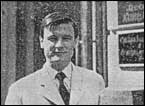
Yamada Kazuo"Promising Russian Movie Director is Kurosawa's Biggest Fan"The following brief interview appeared in the 15 September 1963 issue of the Japanese Weekly Sunday Mainichi. In this interview we are given some insight into which movie directors the 31-year old Tarkovsky admired at the time. It is presented here, for the first time in English, with the kind permission of the interviewer, YAMADA Kazuo. It was translated for Nostalghia.com by SATO Kimitoshi, Japan. 
Please give me your biographical outline. I was born at a village near the Volga, in April 1932. My father is a poet. Finishing school, I idled away for four years, painting and practicing the piano, and for a while I was dreaming of becoming an orchestra conductor. Not knowing where I should go in life, I even studied Arabic language, and took part in an academic expedition with a group of Geographers [should be "Geologists". -Nostalghia.com]. And then a friend advised me to enter VGIK. When did you decide to be a movie director? It was when I joined Mihail Romm's class and saw Ivan the Terrible by Eisenstein for the first time. I was truly overwhelmed by the artistic power of the cinema. What urged you to direct Ivan's Childhood? I created The Steamroller and the Violin as my graduation movie of the VGIK in 1960. Soon after graduating, I entered the production group led by Grigory Alexandorov at the Mosfilm studio, and a group people who had seen The Steamroller, recommended that I should pick up the original book of Ivan's Childhood. I was attracted by the story and finished the film in six months. What is your message in this movie? The terror and fear of war is not only the destruction and devastation of houses and lands, nor loss of many human lives, but war also robs children of their childhood. This is it. That is why I strived to express tragedy by describing the inner world of a young boy. [To my surprise, it was Tarkovsky who changed the theme, and began to talk about Japanese cinema, and praise Kurosawa in deep respect and heated enthusiasm. -Yamada] I was truly fascinated when I saw Kurosawa's movies: The Idiot, Seven Samurai, Rashomon. Kurosawa gave me a joyful surprise by showing his wonderful comprehension of the characters of Ragojin and Muishukin in The Idiot, and I found Seven Samurai very impressive because it was a truly beautiful "people's movie," by making full use of Japanese people's traditions. Because the most important problem for the cinema artist is to create a "people's movie." [At this point, he was the one who started questioning. He was quite inquisitive about what Kurosawa was doing now, and after gathering information from me, he even beseeched that I should give Kurosawa his heartfelt love and reverence. -Yamada] Give me the names of the movie directors you respect outside Soviet Russia, besides Kurosawa. Luis Buñuel, Ingmar Bergman, Andrzej Munk. I regret most of the French directors have lost French national tradition, and I consider François Truffaut the best now. Among my favorite directors are Luchino Visconti who directed The Earth Will Tremble and Rocco And His Brothers, John Ford who made Grapes of Wrath, and Orson Welles who created Citizen Kane. But as for Grapes of Wrath, I appreciate the original book better. I hear that your next movie will be about The Passion of Andrei which is to depict Rublov the 15th century painter.
Yes. I want to create it to shed light on the inner world of the
genius artist, and to investigate how deeply the creation of a great
artist is related to his time and people's life.
See also:
|

